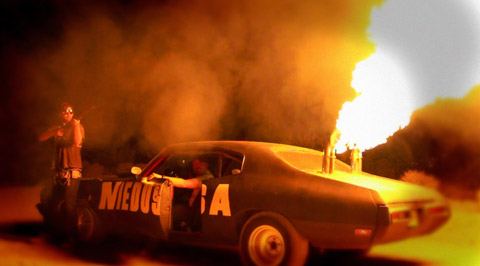
ROAD WARRIOR The DNA of the Mad Max films is as visible in Evan Glodell’s film as the dirt on its
frames. |
If you didn't think it was possible to get some stares from jaded onlookers here in the streets of Boston, you haven't been strapped into Medusa, a heavily modified '72 Buick Skylark equipped with a massive silver engine sprouting through its hood, a PA system, external surveillance cameras and, oh, twin exhaust pipes that shoot diesel-burning flame 30 feet into the air.
>> READ: Review: Bellflower by Peter Keough <<
This dark beauty of a muscle car was parked in front of the Liberty Hotel when I first laid eyes on her, and although she was subject to much auto-eroticized gazing from hotel guests, she wouldn't have looked a bit out of place if she were parked here back in the days when she rolled off the production line, when the Liberty was still operating in its former capacity as a vastly different place of lodging, the Charles Street Jail.
This was on a warm, sunny day back in April, and I was visiting the luxury hotel to interview Evan Glodell, the California writer/director/co-producer/co-editor/star of Bellflower, which was enjoying its local premiere at the Independent Film Festival.
If Glodell doesn't sound like he's busy enough as a multi-hyphenate filmmaker, consider that he also customized Medusa. What exactly is this man's background?
"Not in building cars," he tells me on a balcony overlooking the remnants of old prison cells. "But in building things."
Things. You know, everyday items. Like flamethrowers. Did he need any sort of special permits to construct the flame-spewing nightmare that lights up the silver screen in his feature debut?
"Oh, I imagine so, but we didn't have any."
But, at least he didn't leave a trail of evidence for his permit-less activity.
"No," he laughs. "Just an entire movie."
He also built the digital cameras that were used for the production, including a highly modified prototype SI-2K.
"It's a very good camera," he says, beaming like a proud papa. Playing down some of his baby's shortcomings, he says, "They [SK manufacturers Silicon Imaging Inc.] obviously have bad marketing, because no one's heard of them and they've been around longer than the Red, and they're very good cameras." Even more so when customized with his own optics. He calls the result a "Frankencamera." As such, it records some pretty nasty-looking images. Was that fecal matter that I detected smeared across the lens in some shots?
"That would be crazy!" No, in building one's own cameras — and especially your own optics — he says, "They tend to get real dirty, real fast. Like, within about 10 minutes of shooting outdoors. You end up with all kinds of crazy-looking stuff. Sometimes it's planned. Sometimes it's not." Either way, it's aided the buzz surrounding his film.
Glodell avoided film school, falling into moviemaking with his friends, forming the production company Coatwolf (the name is tattooed on the inside of his upper-arm), where they cut their teeth making short films. Was he an obsessive movie-watcher?
"No. I really do like movies, but I'm not a movie geek."
What about The Road Warrior? The DNA of the Mel Gibson classic is as visible in this film as the dirt on its frames.